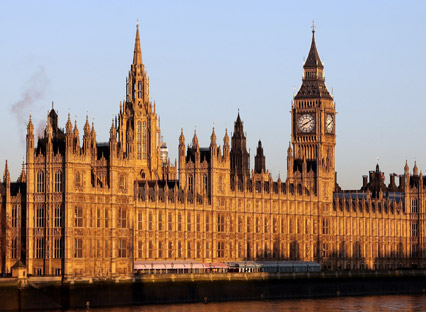Coronavirus: UK to launch ‘virtual parliament’
Commons speaker requested move to allow MPs to scrutinise government’s crisis response

A free daily email with the biggest news stories of the day – and the best features from TheWeek.com
You are now subscribed
Your newsletter sign-up was successful
The UK government is to set up a virtual parliament to allow MPs to ask questions about Downing Street’s response to the ongoing coronavirus pandemic.
The decision follows what Sky News describes as an “unprecedented intervention” on Wednesday by House of Commons Speaker Lindsay Hoyle, who argued that MPs should be able to quiz government departments and ministers from home until they return to Westminister.
Parliament was shut down a week early for the Easter break in a bid to prevent the spread of the virus, and questions remain over whether MPs will be allowed to return when the recess officially ends on 21 April.
The Week
Escape your echo chamber. Get the facts behind the news, plus analysis from multiple perspectives.

Sign up for The Week's Free Newsletters
From our morning news briefing to a weekly Good News Newsletter, get the best of The Week delivered directly to your inbox.
From our morning news briefing to a weekly Good News Newsletter, get the best of The Week delivered directly to your inbox.
In an open letter to Commons leader Jacob Rees-Mogg, Hoyle argued that a previous trial of virtual select committee hearings had been successful, and said he had asked officials to investigate how they would apply similar technology for use in the chamber, The Guardian reports.
Hoyle wrote: “Once the house returns, if we are still in the grip of the crisis where the physical presence of members, or too many members, in the palace is not appropriate, I am keen that they should be able to participate in key parliamentary proceedings virtually, for example oral questions, urgent questions, statements.
“The House Service has already trialled some virtual select committee evidence sessions with witnesses, and I have asked officials to investigate how they would apply similar technology to the types of business listed above.”
–––––––––––––––––––––––––––––––For a round-up of the most important stories from around the world - and a concise, refreshing and balanced take on the week’s news agenda - try The Week magazine. Start your trial subscription today–––––––––––––––––––––––––––––––
A free daily email with the biggest news stories of the day – and the best features from TheWeek.com
The speaker’s proposal was welcomed by opposition politicians including Labour MP Charlotte Nichols, who tweeted: “In a time of national crisis, MPs have more questions than we have answers and limited ways to raise these with ministers when parliament is in recess to advocate for our constituents as effectively as they deserve.”
Rees-Mogg subsequently confirmed that the technology would be in place by the time MPs are due to return later this month.
“Parliament’s role of scrutinising government, authorising spending and making laws must be fulfilled and in these unprecedented times that means considering every technological solution available,” the Commons leader said. “We are exploring options with the parliamentary authorities in readiness for parliament’s return.”
The move may pose significant technical challenges, however.
As the BBC notes, the Palace of Westminster - parts of which date back to the Middle Ages but which was rebuilt in the Victorian era - “was not created for technological innovations”.
By contrast, both the Welsh and Scottish assemblies were build in the 21st century and are more suitable for video links and potential remote voting.
-
 The Olympic timekeepers keeping the Games on track
The Olympic timekeepers keeping the Games on trackUnder the Radar Swiss watchmaking giant Omega has been at the finish line of every Olympic Games for nearly 100 years
-
 Will increasing tensions with Iran boil over into war?
Will increasing tensions with Iran boil over into war?Today’s Big Question President Donald Trump has recently been threatening the country
-
 Corruption: The spy sheikh and the president
Corruption: The spy sheikh and the presidentFeature Trump is at the center of another scandal
-
 How corrupt is the UK?
How corrupt is the UK?The Explainer Decline in standards ‘risks becoming a defining feature of our political culture’ as Britain falls to lowest ever score on global index
-
 The Mandelson files: Labour Svengali’s parting gift to Starmer
The Mandelson files: Labour Svengali’s parting gift to StarmerThe Explainer Texts and emails about Mandelson’s appointment as US ambassador could fuel biggest political scandal ‘for a generation’
-
 The high street: Britain’s next political battleground?
The high street: Britain’s next political battleground?In the Spotlight Mass closure of shops and influx of organised crime are fuelling voter anger, and offer an opening for Reform UK
-
 Is a Reform-Tory pact becoming more likely?
Is a Reform-Tory pact becoming more likely?Today’s Big Question Nigel Farage’s party is ahead in the polls but still falls well short of a Commons majority, while Conservatives are still losing MPs to Reform
-
 Taking the low road: why the SNP is still standing strong
Taking the low road: why the SNP is still standing strongTalking Point Party is on track for a fifth consecutive victory in May’s Holyrood election, despite controversies and plummeting support
-
 What difference will the 'historic' UK-Germany treaty make?
What difference will the 'historic' UK-Germany treaty make?Today's Big Question Europe's two biggest economies sign first treaty since WWII, underscoring 'triangle alliance' with France amid growing Russian threat and US distance
-
 Is the G7 still relevant?
Is the G7 still relevant?Talking Point Donald Trump's early departure cast a shadow over this week's meeting of the world's major democracies
-
 Angela Rayner: Labour's next leader?
Angela Rayner: Labour's next leader?Today's Big Question A leaked memo has sparked speculation that the deputy PM is positioning herself as the left-of-centre alternative to Keir Starmer